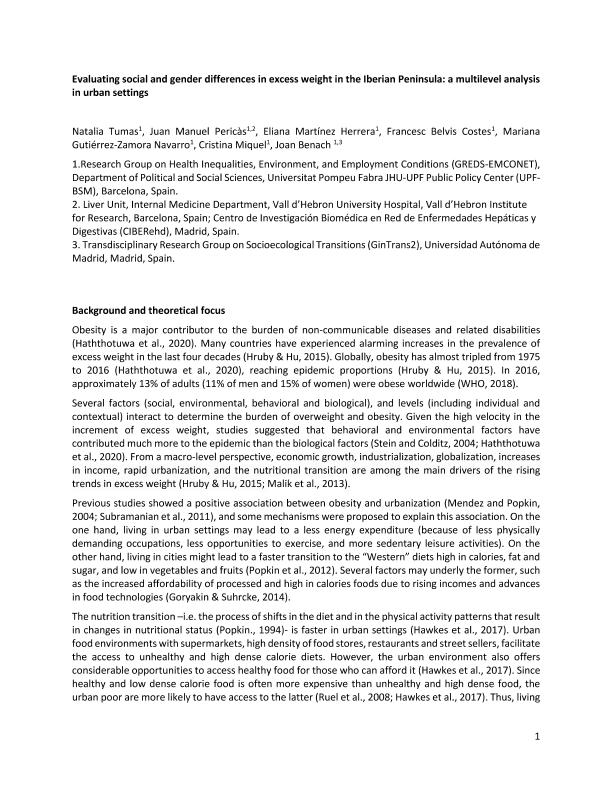Evento
Evaluating social and gender differences in excess weight in the Iberian Peninsula: A multilevel analysis in urban settings
Tumas, Natalia ; Pericàs, Juan M.; Martínez Herrera, Eliana; Belvis Costes, Francesc; Gutiérrez-Zamora Navarro, Mariana; Benach, Joan
; Pericàs, Juan M.; Martínez Herrera, Eliana; Belvis Costes, Francesc; Gutiérrez-Zamora Navarro, Mariana; Benach, Joan
 ; Pericàs, Juan M.; Martínez Herrera, Eliana; Belvis Costes, Francesc; Gutiérrez-Zamora Navarro, Mariana; Benach, Joan
; Pericàs, Juan M.; Martínez Herrera, Eliana; Belvis Costes, Francesc; Gutiérrez-Zamora Navarro, Mariana; Benach, Joan
Tipo del evento:
Conferencia
Nombre del evento:
European Population Conference
Fecha del evento:
29/06/2022
Institución Organizadora:
Netherlands Interdisciplinary Demographic Institute;
University of Groningen;
Título de la revista:
European Population Conference
Editorial:
Netherlands Interdisciplinary Demographic Institute
Idioma:
Inglés
Clasificación temática:
Resumen
Obesity is a major contributor to the burden of non-communicable diseases and related disabilities (Haththotuwa et al., 2020). Many countries have experienced alarming increases in the prevalence of excess weight in the last four decades (Hruby & Hu, 2015). Globally, obesity has almost tripled from 1975 to 2016 (Haththotuwa et al., 2020), reaching epidemic proportions (Hruby & Hu, 2015). In 2016, approximately 13% of adults (11% of men and 15% of women) were obese worldwide (WHO, 2018). Several factors (social, environmental, behavioral and biological), and levels (including individual and contextual) interact to determine the burden of overweight and obesity. Given the high velocity in the increment of excess weight, studies suggested that behavioral and environmental factors have contributed much more to the epidemic than the biological factors (Stein and Colditz, 2004; Haththotuwa et al., 2020). From a macro-level perspective, economic growth, industrialization, globalization, increases in income, rapid urbanization, and the nutritional transition are among the main drivers of the rising trends in excess weight (Hruby & Hu, 2015; Malik et al., 2013). Previous studies showed a positive association between obesity and urbanization (Mendez and Popkin, 2004; Subramanian et al., 2011), and some mechanisms were proposed to explain this association. On the one hand, living in urban settings may lead to a less energy expenditure (because of less physically demanding occupations, less opportunities to exercise, and more sedentary leisure activities). On the other hand, living in cities might lead to a faster transition to the “Western” diets high in calories, fat and sugar, and low in vegetables and fruits (Popkin et al., 2012). Several factors may underly the former, such as the increased affordability of processed and high in calories foods due to rising incomes and advances in food technologies (Goryakin & Suhrcke, 2014). The nutrition transition –i.e. the process of shifts in the diet and in the physical activity patterns that result in changes in nutritional status (Popkin., 1994)- is faster in urban settings (Hawkes et al., 2017). Urban food environments with supermarkets, high density of food stores, restaurants and street sellers, facilitate the access to unhealthy and high dense calorie diets. However, the urban environment also offers considerable opportunities to access healthy food for those who can afford it (Hawkes et al., 2017). Since healthy and low dense calorie food is often more expensive than unhealthy and high dense food, the urban poor are more likely to have access to the latter (Ruel et al., 2008; Hawkes et al., 2017). Thus, living 2 in urban areas might have different impact in overweight and obesity, depending on the social position of individuals. In Europe, 53% of adults are overweight or obese (De Schutter et al., 2020; Marques et al., 2014). In line with that, in the Iberian Peninsula (Spain and Portugal), excess weight affects more than half of the adult population (Busutil et al., 2017; Carreira et al., 2012). Janssen et al. (2020) estimated an age standardized prevalence of obesity in adult population of 22.7% in men and 24.9% in women of Portugal, and 27.5% in men and 27.2% in women of Spain in 2016. They also projected for 2060 a decrease in the obesity prevalence and in the existing gender gap in Portugal (18% and 17.7% in men and women, respectively), but an increase in the prevalence of obesity among men in Spain as well as in the gender gap (30% for men and 27% for women). Numerousstudiessuggested thatsocial position and gender are related to the excess weight in the Iberian Peninsula (Ortíz-Moncada et al., 2011; Merino Ventosa & Urbano-Garridos, 2016; Gaio et al., 2018; Hernández-Yumar et al., 2018; García-Goñi & Hernández-Quevedo, 2012; Oliveira et al., 2018; RodríguezCaro et al., 2016; Costa-Font & Gil, 2008). In Portugal, higher prevalence of overweight and obesity were found among individuals with lower educational background and women (Gaio et al., 2018; Oliveira et al., 2018). Moreover, in Spain Rodríguez-Caro et al. (2016) showed a large and rising social gradient in obesity (especially with respect to educational attainment), more noticeable among women. However, scarce evidence exists on the effect of urban social determinants beyond individual social position on excess weight, and even less about the interplay between individual- and city-level social factors in these associations in Spanish and Portuguese cities. Thus, the aims of this study are to evaluate the association between urban social indicators and excess weight by gender in cities of the Iberian Peninsula, and to analyze to what extent these associations vary by individual education.
Palabras clave:
EXCESS WEIGHT
,
SOCIAL AND GENDER INEQUALITIES
,
MULTILEVEL
,
IBERIAN PENINSULA
Archivos asociados
Licencia
Identificadores
Colecciones
Eventos(CIECS)
Eventos de CENTRO DE INVESTIGACIONES Y ESTUDIO SOBRE CULTURA Y SOCIEDAD
Eventos de CENTRO DE INVESTIGACIONES Y ESTUDIO SOBRE CULTURA Y SOCIEDAD
Citación
Evaluating social and gender differences in excess weight in the Iberian Peninsula: A multilevel analysis in urban settings; European Population Conference; Groningen; Países Bajos; 2022; 1-4
Compartir



